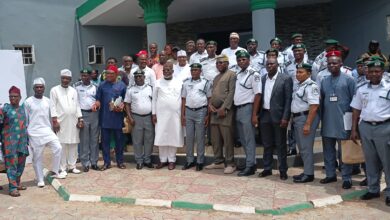INTERVIEW: How Customs Deploys Engagement, Enlightenment to Prepare Oyo Border Communities for AfCFTA – Comptroller Aliyu

Comptroller Gambo Iyere Aliyu, Customs Area Controller, Oyo/Osun Command sat with Ismail Aniemu for one hour where he explained in an exclusive interview how he is hitting good results for the national economy.
Operating from Ibadan, the largest town in West Africa, his task for optimum patrol places the responsibility of strategic manpower deployment with available resources.
Aliyu has justified his presence on the ground with unrelenting anti smuggling, uncompromising revenue collection and sustained rapport with the organised private sector and other stratas of the business community
Q: How has it been settling down to work as Controller overseeing customs activities in the two states of Oyo and Osun with your command headquarters seated in the largest city in West Africa by land mass?

Settling down to work as the Area Controller overseeing customs activities across Oyo and Osun States has been both challenging and fulfilling. The Oyo/Osun Area Command is a very strategic formation, not only because of its vast coverage but also due to its headquarters being located in Ibadan the largest city in West Africa by landmass. This position comes with enormous responsibility, given the volume of trade, and the diverse border communities within the Command’s jurisdiction.
From the onset, my focus has been on consolidating the gains of my predecessors while implementing strategies that enhance revenue generation, trade facilitation, and anti-smuggling operations. The support and cooperation of my officers and men, coupled with the understanding of stakeholders within the business community, have greatly eased the process of settling down.
We’ve also prioritized synergy with sister security agencies and other government institutions, recognizing that collaboration is vital for effective border management and enforcement. So, while the task is demanding, the results so far have been quite encouraging and we remain committed to achieving even greater operational efficiency in line with the vision of the Comptroller-General of Customs and the management team.

Q:Specifically, tell us about your patrol capabilities and how your logistics make impact within your area of responsibility, suppressing smuggling and making arrests
Our patrol capabilities within the Oyo/Osun Area Command are robust and strategically structured to cover all identified flashpoints and border corridors within our area of responsibility. We operate a well-coordinated network of patrol teams that are both proactive and intelligence-driven. These teams work round the clock to ensure effective surveillance of both approved and unapproved routes used by smugglers.
In terms of logistics, the Command is adequately equipped with operational vehicles, communication gadgets, and other enforcement tools that enhance our field operations. We also ensure regular maintenance of our patrol vehicles and provide necessary welfare and motivational support to officers in the field. These measures collectively improve mobility, response time, and operational efficiency.

Our logistics strength directly impacts our enforcement success enabling us to suppress smuggling activities, intercept contraband goods, and make notable arrests. Through efficient deployment of logistics and manpower, we’ve been able to sustain a high level of anti-smuggling operations and contribute significantly to the overall revenue drive of the Service.
Q:This command holds almost all facets of customs operation with strong excise activities, anti-smuggling operations, border patrol at Shaki with an emerging 90 hectares dry port coming up in Moniya. How do you cope in terms of manpower deployment to achieve productivity?
Despite the wide scope of our operations, we ensure strategic manpower deployment based on operational priorities. Through effective task allocation, continuous training, and rotation of officers for optimum coverage, we maintain high productivity levels. Our focus on teamwork, intelligence sharing, and motivation enables us to meet all operational demands efficiently across excise, anti-smuggling, border patrol, and the emerging dry port operations.
Q:We have seen robust stakeholders’ engagement by you with sister government agencies, traditional rulers and members of the business community. Tell us how this is contributing to your success.
Stakeholders’ engagement has been pivotal to our success. It fosters mutual understanding, intelligence sharing, and voluntary compliance. By building trust and collaboration with sister agencies, traditional rulers, and the business community, we enhance operational synergy, reduce conflicts, and create a more conducive environment for trade facilitation and effective enforcement.

Q:How would you appraise the volume of legitimate trade at Shaki, what are you doing differently to facilitate it and support Nigeria’s participation in the African Continental Free Trade Area (AfCFTA)
The volume of legitimate trade at Shaki is steadily increasing due to our sustained engagement with traders and border communities. We have simplified clearance processes, strengthened border infrastructure, and promoted compliance through awareness campaigns. These efforts align with our mandate to boost cross-border trade and position Nigeria for greater competitiveness under the AfCFTA framework.
Additionally, we have engaged the organized private sector – precisely the Ibadan Chamber of Commerce where we had sensitized the members of the OPS on Value Addition & Substantial transformation in line with the Rule of Origin criteria – so as to take advantage of the market valued at over 3trn USD with a combined population of 1.2billion.
The market is huge & the stage is set & Nigerian traders must take advantage of this. We are also in talks about formalizing informal trade along the ECOWAS corridor. This will aid statistical records on the volume of trade.
Q:How compliant are your stakeholders measuring on a scale of zero to hundred especially the excise companies and what effort has the NCS made to uncover manufacturers not compliant with excise regulations?
Stakeholder compliance, especially among excise companies, stands at about 85%, showing strong adherence to regulations. To address non-compliance, the Service intensifies factory inspections, conducts compliance audits, and leverages intelligence networks to identify and register unlisted manufacturers engaged in export activities and also the breach to excise regulations is address in line with the Nigeria Customs Service Act 2023.
Q:Tell us about ICT, modernisation and tech development. To what extent has your activities been impacted by Unified Customs Management System (UCMS) also known as B’Odogwu
The introduction of the Unified Customs Management System (UCMS), also known as B’Odogwu, has greatly enhanced our efficiency. It has streamlined processes, improved data accuracy, and reduced clearance time. With this technology, our operations are more transparent, integrated, and responsive, aligning perfectly with the Service’s modernization and digital transformation agenda.
Q:Typical of Yuletides, as the year wind down smuggling activities spike nationwide, how prepared are you for this?
We are fully prepared for the yuletide period with intensified patrols, intelligence-led operations, and strategic deployment of officers across all flashpoints. Our surveillance teams are on high alert to curb smuggling and ensure sustained compliance throughout the festive season.
Q:What message do you have for your stakeholders for end of the year and the new year 2026?
As we close 2025, I thank our stakeholders for their continued cooperation and compliance. In 2026, we urge everyone to uphold trade regulations, embrace transparency, and partner with us to facilitate legitimate trade while combating smuggling for a prosperous and secure business environment.












🔍 Managing guest posts or UGC at scale? Try gpt watermark remover for text-only pipelines: detect probabilistic markers, normalize whitespace, and strip zero-width joiners while preserving semantics; pair with review notes referencing ai watermark, ai watermark remover free, and remove watermark ai so moderators can see what changed and why; you’ll reduce false positives, keep tone consistent, and maintain a defensible audit trail aligned with editorial guidelines, especially when multiple writers, locales, and CMS templates introduce hidden glyphs that inflate file size or trigger automated checks unintentionally.
anatolian sky gulet Sarah M. The Bosphorus cruise was stunning. Seeing both sides of Istanbul from the water was unforgettable. https://www.facebook.com/travelshopbooking/videos/
https://t.me/s/officials_pokerdom/3640
https://t.me/s/iGaming_live/4866